
Molly Cake
Molly cake is a super fluffy and spongy cake made with whipped egg whites and enriched with egg yolks and whipped cream. It is often used as layers cakes in European desserts.
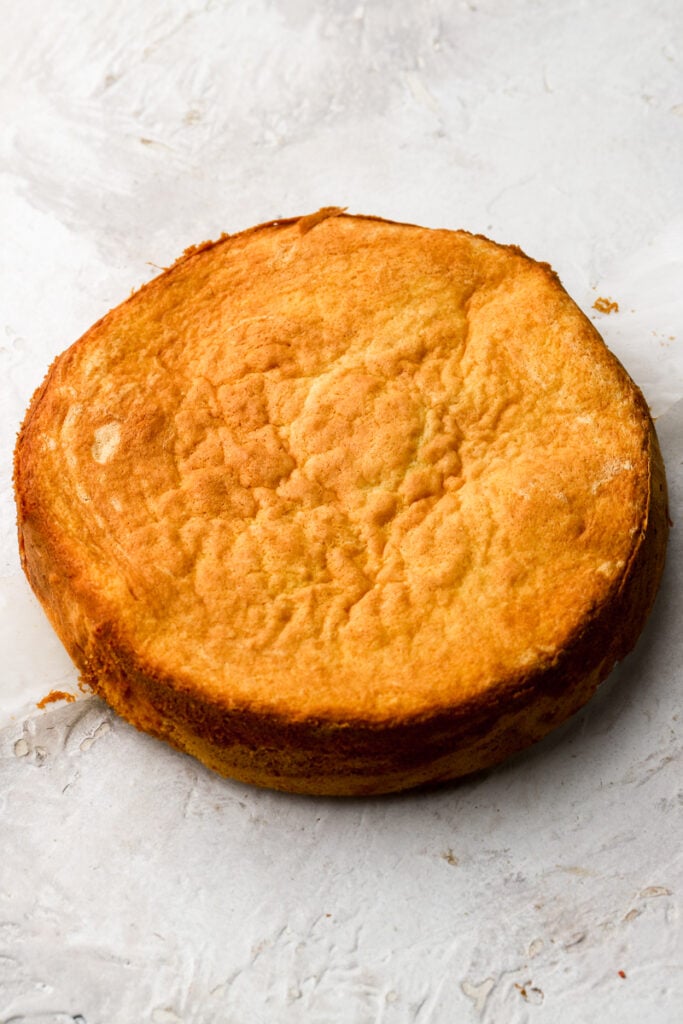
Why you’ll love the recipe
- It’s super light and fluffy, and so versatile in recipes.
- Can be baked in different size pans, made to different heights, sliced super thin or left as thicker layers.
- Not overly sweet but can be made sweeter with simple syrup.
- Recipe is customizable and works well with dairy free and gluten-free ingredients as well.
What is Molly cake?
This type of sponge is called a molly cake and it’s known for having whipped cream folded into the batter.
You remember in my book, Frosted, how I introduce you to the type of buttercreams in the beginning of the book and then use those buttercreams in different ways throughout the book?
Well there is a list of base sponge cake recipes, just like that. Of course, everyone makes them a little different but each type of sponge has specific characteristics.
Molly cake is light, fluffy and super spongy, just like most types of sponge cakes. The whipped egg whites and the whipped cream are what make it super fluffy but the addition of egg yolks are what keep it moist and give it flavor.
For more classic base recipes, make sure to check out my baking basics page.
For more classic base recipes, make sure to check out my baking basics page.
How to ensure a good rise
Traditionally sponge cakes are known using whipped eggs to give them rise. Some also are enriched egg yolks and butter/cream/oil. It’s common for sponge cakes to not use a leavening agent but the more fat that is added to a batter, the more it’s weighed down. Unfortunately it’s quite easy to deflate the eggs when mixing in the rest of the ingredients and without baking soda or baking powder, you’ll end up with a flat dense cake if that happens.
Molly cake is a bit more sensitive and higher in fat than other sponge cakes, similar to chiffon, so it does use a little baking powder to give a lift. However you still want to make sure you’re incorporating enough air into the batter to give it that airy texture.
So there’s two ways to stabilize the meringue and ensure that it doesn’t deflate completely when adding in the heavy cream and flour. The first way is to gently cook the eggs and the sugar over a bain marie (double boiler), whisking until the sugar is fully dissolved. Then beat it until it’s super thick and the mixture ribbons off the whisk.
The second way, my preferred way, is to beat the egg whites with the sugar separately (not as traditional but same ingredients, more consistent results), until it forms a super fluffy meringue with stuff peaks. Then when adding the rest of the ingredients, I continue with the mixer instead of folding by hand.
I use this method for my genoise and my pan di spagna.
Ingredients & Substitutions
- Flour: I use all purpose flour in most of my recipes and I HIGHLY recommend using a digital scale, as flour is so often over measured. Cake flour also works well in this recipe.
- Baking Powder: Most sponge cakes are known for not using a leavening agent since they rely on the eggs to lift the cake. HOWEVER, for this cake I recommend 2 tsp of baking powder because of the higher fat content.
- Heavy Cream: I recommend a heavy whipping cream that’s 36-40% fat. Whip it just until you reach stiff peaks, no more, then fold it into the batter.
- Sugar: I used granulated sugar. I have not tested it with any other type of sugar but I don’t recommend reducing the sugar in the cake as it’s not super sweet anyway.
- Eggs: Make sure to use room temperature, large eggs, about 55-60g each (without the shell).
- Pop them in hot water for a few minutes if they’re cold.
- Unfortunately I have not made this cake without eggs but I know some people have had success with using aquafaba for sponge cakes so try looking up a vegan sponge cake recipe.
- Vanilla: I usually just use a simple vanilla extract in cake batters but I like to use vanilla bean paste for buttercreams and frostings.
Step-by-Step Instructions
Step 1: Start by separating the egg yolks from the whites. Beat the egg whites with the sugar until it’s super thick and fluffy and holds stiff peaks.
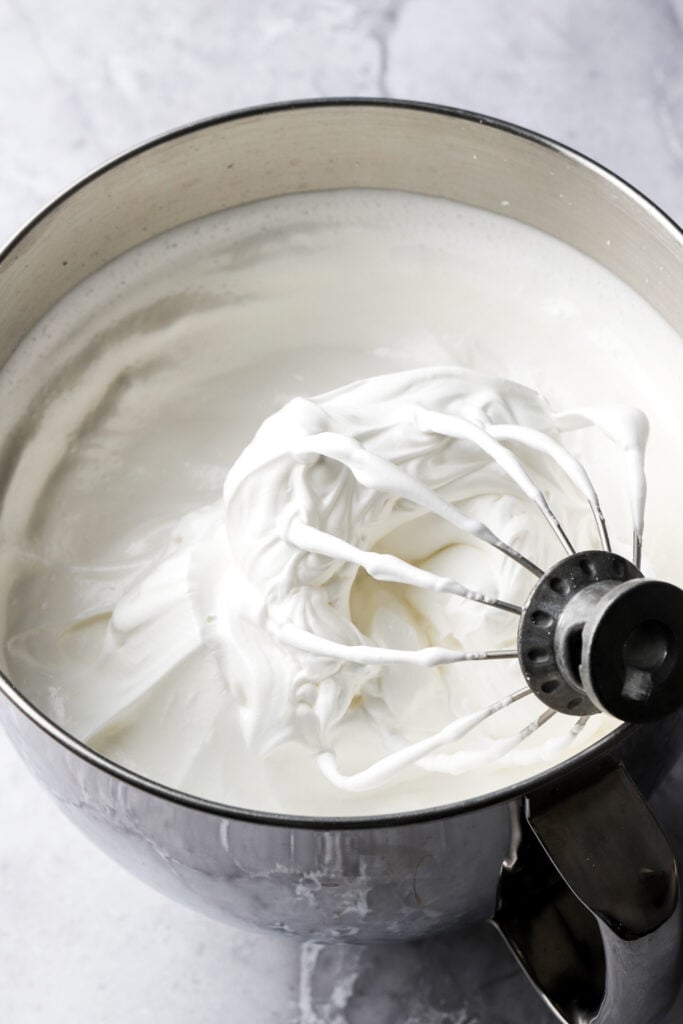
Step 2: Add the egg yolks and vanilla and beat at medium-high speed until it’s combined, just a few seconds.
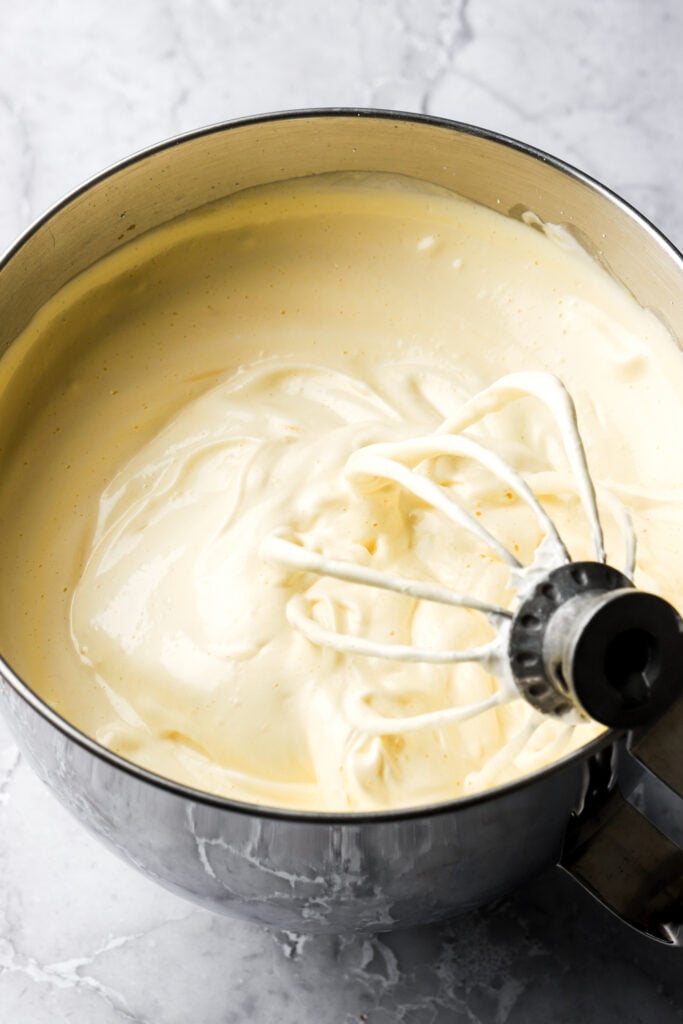
Step 3: Sift in the flour and salt and beat at medium-low speed, just until the flour is mixed in. Use a rubber spatula to fold the mixture a couple of times to scrape the edge of the bowl.
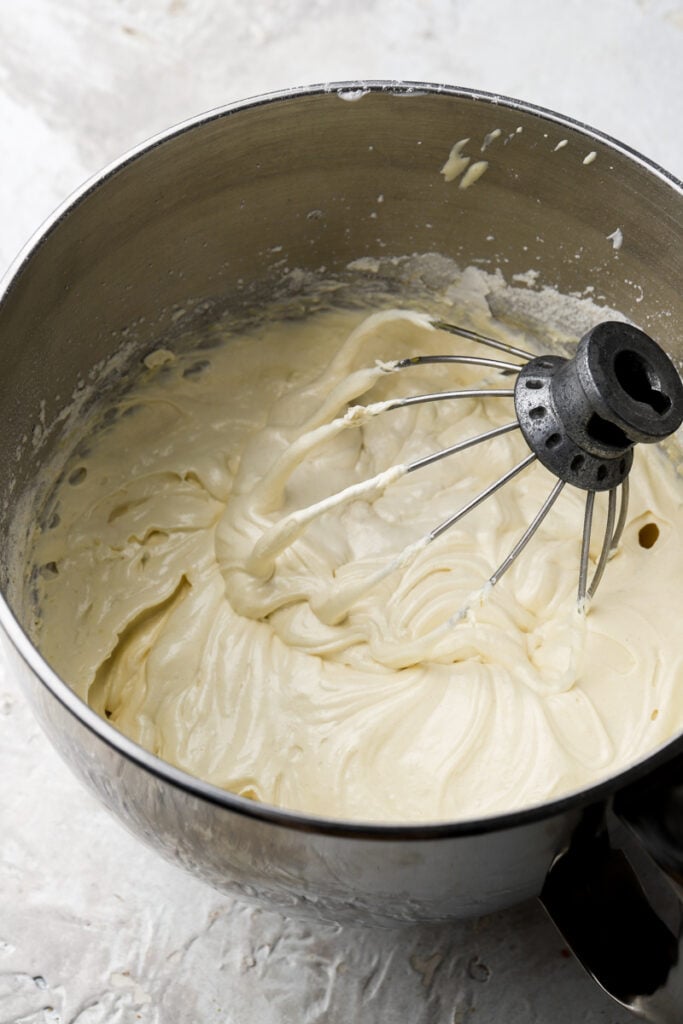
Step 4: Whip the cream until it reaches stiff peaks.
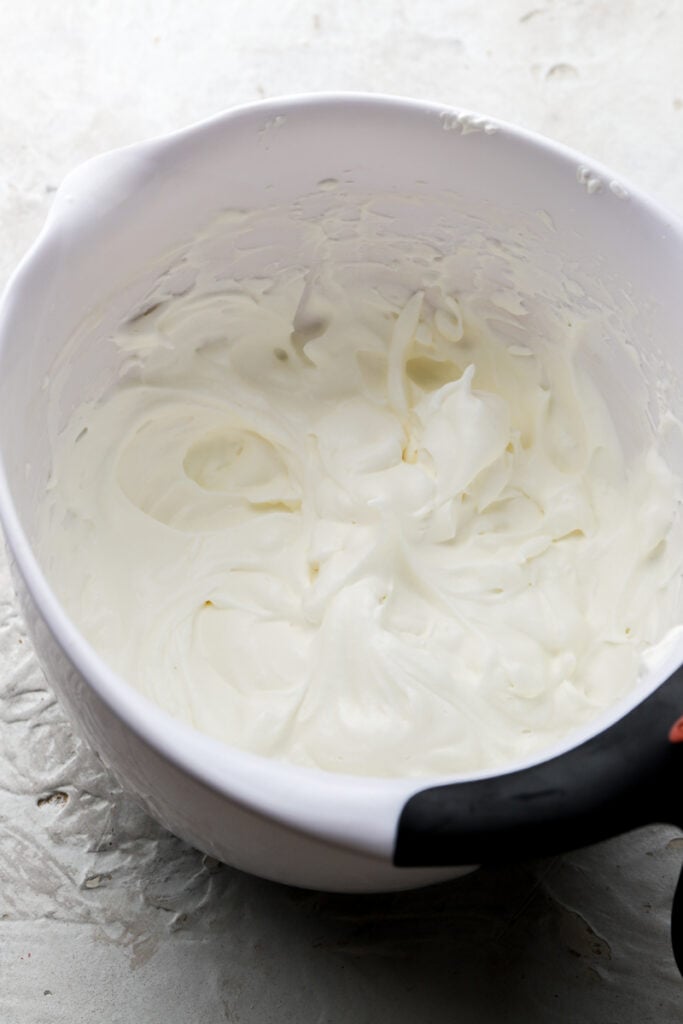
Step 5: Fold the cream into the batter just until it’s completely blended in.
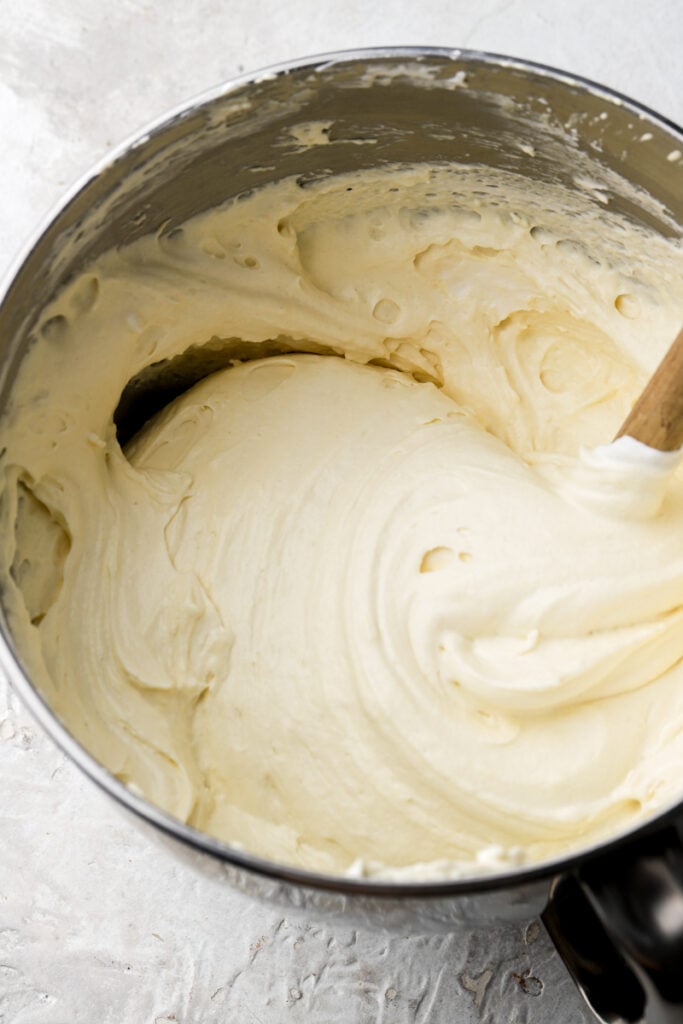
Step 5: Distribute the batter evenly among the pans lined with parchment paper, about 15-16 ounces each, and bake for 25-ish minutes. The tops will be golden brown, no longer wet and spring back when you press on them gently.

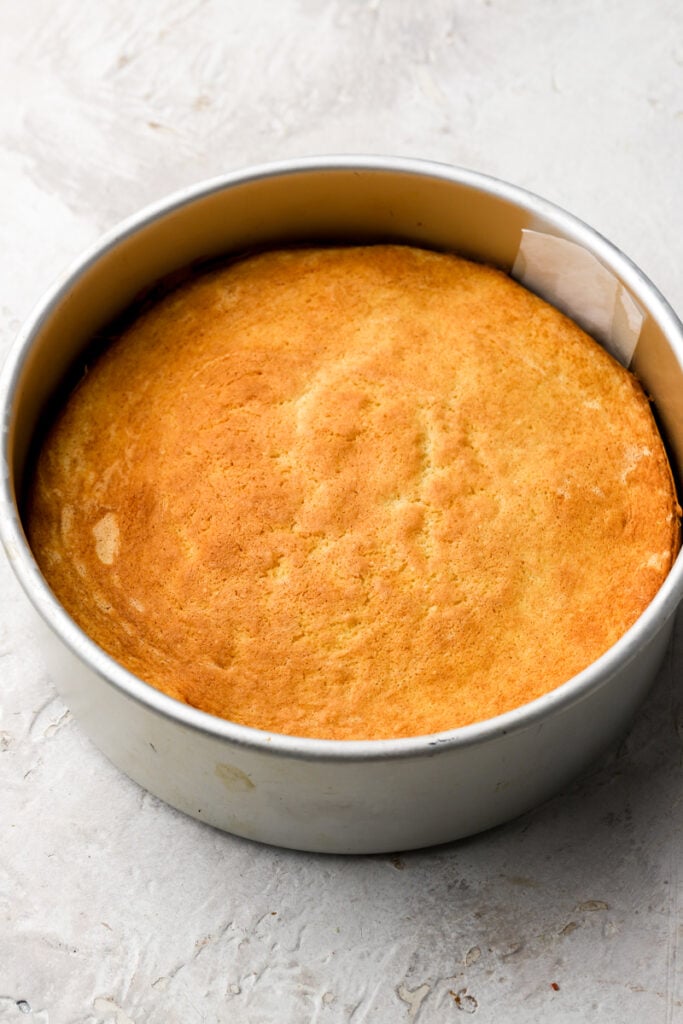
Preparing the cake pan
Unlike other sponge cakes, because molly cakes use baking powder it’s ok to grease the pan. I still prefer to only grease and line the bottom and not grease the sides so much because cakes tend to bake more straight (without the hump in the center) if the sides aren’t greased.
I line the bottom of the pan with a round parchment paper that has an overhang so it lets me remove it easily.
What size to bake this cake in
The cake can be baked in:
- Half batch – one layer 8 inch cake; bake for about 18-20 minutes.
- Half batch – one layer 9 inch cake; bake for about 16-19 minutes.
- Full batch – three layer 6 inch cake; about 7-8 oz each and bake for about 14-16 minutes.
- Full batch – two layer 8 inch cake; about 10-11 oz each and bake for about 18-20 minutes.
- Full batch – two layer 9 inch cake; about 10-11 oz each and bake for about 16-19 minutes.
- Full batch – one layer 9×13 inch cake; bake for about 30-40 minutes.
Can I flavor the sponge?
You don’t want to mess too much with the sponge itself because it’s quite delicate. You can certainly remove 2 Tbsp of flour and replace it with unsweetened cocoa powder or add 1-3 tsp of any kind of extract or spice (after the eggs are whipped).
Since we’re using heavy cream here, you could infuse it with flavor before adding it to the cake. Some ideas are chai spices, earl grey, lavender, etc.
Since we’re using baking powder, it would be ok to also add citrus zest. You could also just flavor it with a flavored simple syrup as well.
How to know when sponge cakes are done baking
Sponge cakes are fairly easy to assess when they’re done baking. The top will no longer look wet and it’ll have a golden brown color. Then gently press your finger into it and it should have some resistance and/or spring back. If it feels wet underneath the surface, leave it a few more minutes.
Try not to open the oven until it’s close to being done though.
What type of Frosting to pair with a molly cake?
Like the genoise, molly cake is one of those cakes that pairs well with any type of buttercream or filling. It’s not too soft and not too firm. I love using a whole egg buttercream (download guide below for the recipe) because it doesn’t waste any egg whites or yolks but my favorite for decorating is Swiss Meringue Buttercream.
I also have a French buttercream that would be phenomenal flavor-wise but exudes a yellow color. My cookbook, Frosted has a TON more types of frostings.
Traditional American buttercream and cream cheese buttercream also work well but cream cheese may be a little difficult for decorating.
For the amount of cake in the recipe card, a full batch of buttercream (1 cup of butter) would lightly frost it. If you want to decorate the cake as well, I recommend two full batches of buttercream (2 cups of butter).
Feel free to flavor the buttercreams with
- ½ cup unsweetened cocoa powder per batch of buttercream
- ½ cup melted chocolate (any kind) per batch of buttercream
- ½ cup cookie butter/peanut butter/Nutella, etc
- ½ cup jam
- 2-4 Tbsp freeze dried fruit
- Any kind of extract
Frequently Asked Questions
You don’t NEED it but it really depends on what you’re making. I don’t use a simple syrup when the cake layers are really thin because the cream between all those layers keeps it moist for longer.
For my fraisier cake (genoise but same rules apply), I did use a simple syrup because the two layers were slightly thicker. If you want to add extra flavor to the cake, a simple syrup is definitely helpful.
For example, the coffee soak in my Tiramisu Cake and Opera Cake, the simple syrup in my Cranberry Orange Cake, a lemon simple syrup from my Lemon Poppy Seed Cake, or just a stronger vanilla flavor.
If you find a dairy free cream you like, you can use that. I recommend something with 36-40% fat.
All my cake recipes work well with a 1:1 gluten-free flour like Bob’s Red Mill and King Arthur Flour HOWEVER, I have not tested this with sponge cakes so I am not entirely sure. Some people have told me they had success with it though.
Unfortunately sponge cakes don’t bake up well as cupcakes. They’re flat, more flimsy and oftentimes require a soak which might just make a sad, wet looking cupcake.
How to make ahead
To make the cake ahead of time you can make the cakes even a month in advance. When you remove them from the oven, let them cool for about half an hour and then wrap them individually in plastic wrap. Then place them in a freezer bag, squeezing out all the excess air.
Make sure to work quickly if you frost them while they’re frozen, because the frosting can set way too quickly from the cold cake and make it difficult to spread. Or just pull them out of the freezer 1 hour before frosting.
How to store finished cake
Depending on the type of frosting used with the cake, it may need to be refrigerated. The cake itself can sit out at room temperature but will dry out quicker if it’s not covered or wrapped with plastic wrap.
To freeze, you can make the cakes even a month in advance. When you remove them from the oven, let them cool for about half an hour and then wrap them individually in plastic wrap. Then place them in a freezer bag, squeezing out all the excess air.
Thanks so much for reading today’s post, if you have any questions just comment down below. Make sure to leave it in the comment section because I can’t answer in the rating section.
If you make this molly cake, I’d love it if you left a star rating for me and a comment letting me know what cake you used it in. If it’s less than five stars, please let me know why! 🙂
As always, have a blessed day and happy baking!
Love, B

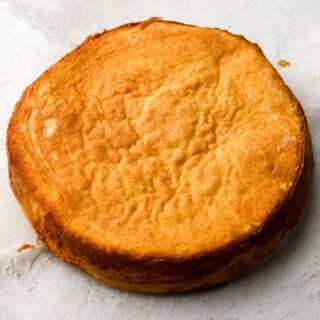
Hi! I’d love to try this cake. Would this be suitable with ganache & mousse fillings? Would it also work as a 2 tier cake (8”&6”) or would the sponge be too soft for that?
Thanks in advance